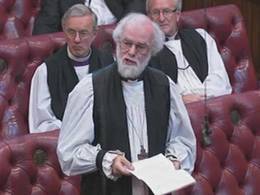House of Lords debate on role and contribution of faith communities

Tuesday 29th May 2012
The Archbishop of Canterbury, Dr Rowan Williams, made a contribution to Lord Sacks’ debate in the House of Lords today, in which he affirmed how our present-day political and legal settlement owes much to 'a long conversation with the Jewish and Christian intellectual world, with the ethics and theology of the human responsibility characteristic of that world'. He also praised the Department for International Development for their work on protocols for partnership with faith organisations in the field of aid and development.The Archbishop’s full contribution to the debate can be found below, or listen to the audio [2Mb, 2 mins]
Debate: ‘Lord Sacks to ask Her Majesty’s Government how they have recognised and supported the role and contribution of faith communities in Britain and the Commonwealth during Her Majesty The Queen’s reign.’
My Lords, like all of us, I am much indebted to the noble Lord, Lord Sacks, for initiating this important discussion, and doing so in this particularly auspicious year. It is a pleasure to pay tribute to someone who has done so much to maintain a credible and challenging presence for religious perspectives in the public sphere.
When people speak as though religion were automatically a problem in our public life, nationally and internationally, this often reflects a plain lack of historical and cultural awareness. Usually through no fault of their own, a generation of administrators and local officials has grown up with little or no sense of how our political and legal history in this country has become what it is as a direct result of a long conversation with the Jewish and Christian intellectual world, with the ethics and the theology of the human responsibility characteristic of that world. A failure to acknowledge this leads to the dangerous assumption that our political and legal settlement needs no argument in its defence because it is obvious to all right-thinking people. But if we are to sustain our legacy of dignity before the law, participative government, and hospitality towards minorities, we had better be aware of just how and why our ancestors developed such a political ethic and what depth of thought and imagination is needed to keep it alive.
This failure of understanding is, of course, one of the things that lies behind the reluctance in recent years to develop effective partnership between statutory bodies and faith groups in the work of social regeneration. But at present the auguries are good, for a change, in this respect. And I want to allude very briefly to the importance of this in the international as well as the national context, and take this opportunity of welcoming the work currently being done by the Department for International Development on protocols for partnership with faith organisations in the field of aid and development. I believe the potential here is enormous, and would want to encourage the Government to do all they can to work with the grain of this increasing sharing of our vision for international justice and well-being.
